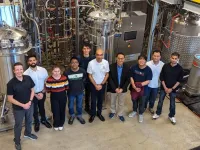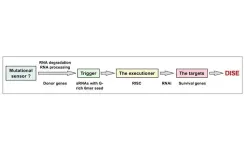(Press-News.org) New research being presented at this year’s Annual Meeting of The European Association for the Study of Diabetes (EASD), Hamburg (2-6 Oct) finds that cigarette smoking increases the risk of developing type 2 diabetes in part by affecting a variety of metabolites—small chemicals produced in the processes of metabolism—that circulate in the bloodstream.
The influence of these metabolic changes on diabetes risk appears to be amplified in individuals with genetic susceptibility to type 2 diabetes or insulin resistance.
The analysis of over 93,000 UK Biobank participants also identified a metabolic signature of 131 metabolic traits that can help predict which smokers are more likely to develop type 2 diabetes.
“Our metabolism is constantly changing depending on what we ingest or are exposed to”, says lead author Yuxia Wei from the Karolinska Institutet in Sweden. “Our study is the first to develop a metabolic signature for smoking based on comprehensive metabolomic profiles, and provides new insights into how smoking influences certain metabolites to increase the risk of type 2 diabetes. The findings underscore the importance of refraining from or quitting smoking to prevent diabetes, particularly for individuals with genetic risk factors for diabetes who seem to be more vulnerable to these changes.”
Previous observational evidence suggests that smokers are 20-60% more likely to develop type 2 diabetes, but the underlying mechanisms are unclear.
To address this knowledge gap, researchers used nuclear magnetic resonance spectroscopy (NMR) to analyse hundreds of metabolites in blood samples from 93,722 never, former, and current smokers (aged 37-73 years) without diabetes at the start of the study (2006-10) from the UK biobank—which holds genetic, health, and medical information from approximately half a million British volunteers. Metabolomics data were collected again in 2012-13.
During an average (median) follow-up of 13 years, 1,869 new cases of diabetes were identified.
The observational analysis and causal relationship analysis identified 131 metabolites affected by smoking, including glycoprotein acetyls (an inflammatory biomarker), fatty acids, and lipids, which collectively indicated whether an individual would go on to develop type 2 diabetes.
Compared with people who never smoked, current smoking increased the risk of type 2 diabetes by 73%; and 38% of this excess risk was mediated through the smoking-related metabolic signature (44% in men and 30% in women), after accounting for traditional diabetes risk factors such as age, sex, education level, ethnicity, BMI, physical activity, diet, and family history of diabetes.
For free fatty acids, smoking seemed to lead to higher levels of unhealthy saturated and monosaturated fatty acids, and lower percentages of healthy polyunsaturated ones such as DHA, omega-6 fatty acids, and omega-3 fatty acids (mainly found in seafood). Smoking was also positively associated with metabolites including different lipids in very-low-density lipoproteins (VLDL), triglycerides, and LDL cholesterol (also called ‘bad’ cholesterol), and lower levels of all forms of HDL cholesterol (often know as good cholesterol).
Importantly, the findings indicate that most of the smoking-related metabolic changes are reversible after quitting smoking.
The analysis also found that a high level of the metabolic signature was associated with a 61% higher risk of developing type 2 diabetes compared to a low level.
Genetic susceptibility also made a difference. Individuals with both a high level of the metabolic signature and a high genetic susceptibility to type 2 diabetes were three times as likely to develop the condition as those with low levels of the signature and genetic susceptibility.
The interaction between genetic susceptibility and the metabolic signature enhances their overall impact on type 2 diabetes. As the Wei explains: “The excess risk of developing type 2 diabetes in people with both a high genetic susceptibility and a high level of the signature surpasses what we would expect by simply adding the excess risk in people with only a high genetic susceptibility and the excess risk in people with only a high level of the signature. Our findings suggest that it is even more important for people with high genetic susceptibility to avoid smoking than the general population.”
The researchers further tested and verified the metabolic signature in blood samples from 3,626 participants in the TwinGene Study, a cohort nested in the Swedish Twin Register. They noted that the ability for the metabolic signature to determine risk of type 2 diabetes was highly reproducible despite the fact that individuals living in the UK and Sweden have different dietary habits, lifestyles, and environmental exposures.
“The reproducibility of the findings in the Swedish population indicate the robustness of the approach”, says Wei. “Nevertheless, more than half of the smoking-diabetes link was not explained by the metabolic signature, suggesting that other pathophysiological consequences of smoking play a role in diabetes development. These mechanisms may include the adverse effects of smoking on pancreatic tissue and beta cell function.”
Despite the important findings, the researchers note several limitations of the study, including that smoking status and metabolite levels may have changed during follow-up, which may have influenced the results; and that the study was conducted in people mainly of European origin, so the findings may not be generalisable to other populations.
This work was supported by the Swedish Research Council, FORTE, the Novo Nordisk Foundation, and the China Scholarship Council.
This press release is based on poster presentation 322 at the annual meeting of the European Association for the Study of Diabetes (EASD). The material has been peer reviewed by the congress selection committee. There is no full paper at this stage, but the research has been submitted to a medical journal for publication. The authors are happy to answer any questions.
END
Metabolic signature can help predict which smokers will develop type 2 diabetes
UK Biobank analysis of over 93,000 adults finds that smoking increases the risk of type 2 diabetes in part through its effects on the metabolism
2023-10-04
ELSE PRESS RELEASES FROM THIS DATE:
Metabolically healthy obesity: fact or fiction?
2023-10-04
A session at this year’s Annual Meeting of the European Association for the Study of Diabetes will explore the latest data on the concept of metabolically healthy obesity (MHO) – more commonly known by the public as ‘fat but fit’. Professor Matthias Blüher, University of Leipzig, Leipzig and Helmholtz Center Munich, Germany will explain how we define MHO and ask if it can really be described as healthy.
“Some 15-20% of people living with obesity have none ...
Emergency department screening could detect thousands of undiagnosed prediabetes and diabetes cases, UK study suggests
2023-10-04
The introduction of screening for type 2 diabetes in Accident and Emergency (A&E) departments could uncover thousands of previously undiagnosed cases every year, suggests new research being presented at this year’s Annual Meeting of The European Association for the Study of Diabetes (EASD), Hamburg (2-6 Oct).
“Early diagnosis is the best way to avoid the devastating complications of type 2 diabetes, and offers the best chance of living a long and healthy life”, says Professor Edward Jude, Tameside and Glossop Integrated Care NHS Foundation Trust, UK. “Symptoms of type 2 diabetes may be absent and can be tricky ...
New stem cell-derived islet therapy improves blood sugar control in all treated patients, with three achieving insulin independence
2023-10-04
Six adults with type 1 diabetes (T1D) treated with stem cell-derived islet cells (VX-880) have shown improved blood sugar control with three participants achieving insulin independence, according to new research being presented at this year’s Annual Meeting of The European Association for the Study of Diabetes (EASD), Hamburg (2-6 Oct).
All patients treated with VX-880 have demonstrated improved glycaemic control, as evidenced by elimination of severe hypoglycaemia (low blood sugar), improvements in HbA1c (a measure of long-term sugar levels) and the amount of time their ...
New pipeline makes valuable organic acid from plants — saving money and emissions
2023-10-03
In a breakthrough for environmentally friendly chemical production, researchers at the Center for Advanced Bioenergy and Bioproducts Innovation (CABBI) have developed an economical way to make succinic acid, an important industrial chemical, from sugarcane.
The team of University of Illinois and Princeton University researchers created a cost-effective, end-to-end pipeline for this valuable organic acid by engineering a tough, acid-tolerant yeast as the fermenting agent, avoiding costly steps in downstream processing. Succinic acid is a widely ...
PARMESAN: An AI-based predictive tool to find new treatments for genetic disorders
2023-10-03
To discover new treatments for genetic disorders, scientists need a thorough knowledge of prior literature to determine the best gene/protein targets and the most promising drugs to test. However, biomedical literature is growing at an explosive rate and often contains conflicting information, making it increasingly time-consuming for researchers to conduct a complete and thorough review.
To address this challenge, Cole Deisseroth, a graduate student enrolled in the M.D./Ph.D. program and mentored by Drs. Huda Zoghbi and Zhandong Liu at the Jan and Duncan ...
PPPL awarded $5 million to lead an Energy Earthshot Research Center focused on clean hydrogen
2023-10-03
Lessening the effects of climate change will require a variety of innovations and a lot of ingenuity. Now, a new center led by the U.S. Department of Energy’s (DOE) Princeton Plasma Physics Laboratory (PPPL) will help these efforts by advancing the understanding of plasma-based clean hydrogen production.
PPPL was selected to lead a DOE Energy Earthshot Research Center (EERC) as part of the Hydrogen Shot™, which aims to reduce the cost of hydrogen by 80%. With funding from the DOE’s Office of Science, the EERCs support fundamental ...
Illinois-led project to sequence 400 soybean genomes, improve future crops
2023-10-03
As a source of protein and biodiesel for cleaner renewable energy, soybean is an important crop worldwide. But is it performing to its full potential? An ambitious effort led by the University of Illinois Urbana-Champaign and the U.S. Department of Energy Joint Genome Institute (JGI) will sequence 400 soybean genomes to develop a “pangenome” — an attempt to characterize all the useful diversity in the genome to create an even more robust and resilient crop.
The soybean pangenome project will sequence and analyze at least 50 soybean genomes from cultivated lines and wild relatives at reference quality, the gold standard of modern sequencing. A further ...
An ancient anti-cancer mechanism: DISE
2023-10-03
“DISE is effective against all cancers we tested.”
A new editorial paper was published in Oncotarget's Volume 14 on September 25, 2023, entitled, “DISE, an ancient anti-cancer mechanism that senses mutational load in cancerous cells?”
In their new editorial, researchers Monal Patel and Marcus E. Peter from Northwestern University discuss a recent breakthrough in cancer therapy. Despite the multiple advances in therapy, cancer remains one of the most common causes of death globally. ...
Project aims to develop all-in-one semiconductor that stores, processes data
2023-10-03
A multi-institutional project led by a Penn State researcher is focused on developing an all-in-one semiconductor device that can both store data and perform computations. The project recently received $2 million in funding over three years as part of the new National Science Foundation Future of Semiconductors (FuSe) program, a $45.6 million investment to advance semiconductor technologies and manufacturing through 24 research and education projects across the United States.
“The goal of ...
Nemours Children’s Health hosts first-ever pediatric session at HLTH
2023-10-03
Nemours Children’s Health will host the first-ever dedicated pediatric session at HLTH, the leading platform bringing together the entire health ecosystem focused on health innovation and transformation. This invited program, “Elevating Kids Health Well Beyond Medicine,” will extend HLTH’s 2023 theme, “Elevating Humanity,” to focus on health in childhood and why it is the only way to build good health across the lifespan.
“The child health perspective is an essential viewpoint for the attendees of HLTH to consider and we are proud to offer ...
LAST 30 PRESS RELEASES:
Kidney cancer study finds belzutifan plus pembrolizumab post-surgery helps patients at high risk for relapse stay cancer-free longer
Alkali cation effects in electrochemical carbon dioxide reduction
Test platforms for charging wireless cars now fit on a bench
$3 million NIH grant funds national study of Medicare Advantage’s benefit expansion into social supports
Amplified Sciences achieves CAP accreditation for cutting-edge diagnostic lab
Fred Hutch announces 12 recipients of the annual Harold M. Weintraub Graduate Student Award
Native forest litter helps rebuild soil life in post-mining landscapes
Mountain soils in arid regions may emit more greenhouse gas as climate shifts, new study finds
Pairing biochar with other soil amendments could unlock stronger gains in soil health
Why do we get a skip in our step when we’re happy? Thank dopamine
UC Irvine scientists uncover cellular mechanism behind muscle repair
Platform to map living brain noninvasively takes next big step
Stress-testing the Cascadia Subduction Zone reveals variability that could impact how earthquakes spread
We may be underestimating the true carbon cost of northern wildfires
Blood test predicts which bladder cancer patients may safely skip surgery
Kennesaw State's Vijay Anand honored as National Academy of Inventors Senior Member
Recovery from whaling reveals the role of age in Humpback reproduction
Can the canny tick help prevent disease like MS and cancer?
Newcomer children show lower rates of emergency department use for non‑urgent conditions, study finds
Cognitive and neuropsychiatric function in former American football players
From trash to climate tech: rubber gloves find new life as carbon capturers materials
A step towards needed treatments for hantaviruses in new molecular map
Boys are more motivated, while girls are more compassionate?
Study identifies opposing roles for IL6 and IL6R in long-term mortality
AI accurately spots medical disorder from privacy-conscious hand images
Transient Pauli blocking for broadband ultrafast optical switching
Political polarization can spur CO2 emissions, stymie climate action
Researchers develop new strategy for improving inverted perovskite solar cells
Yes! The role of YAP and CTGF as potential therapeutic targets for preventing severe liver disease
Pancreatic cancer may begin hiding from the immune system earlier than we thought
[Press-News.org] Metabolic signature can help predict which smokers will develop type 2 diabetesUK Biobank analysis of over 93,000 adults finds that smoking increases the risk of type 2 diabetes in part through its effects on the metabolism



